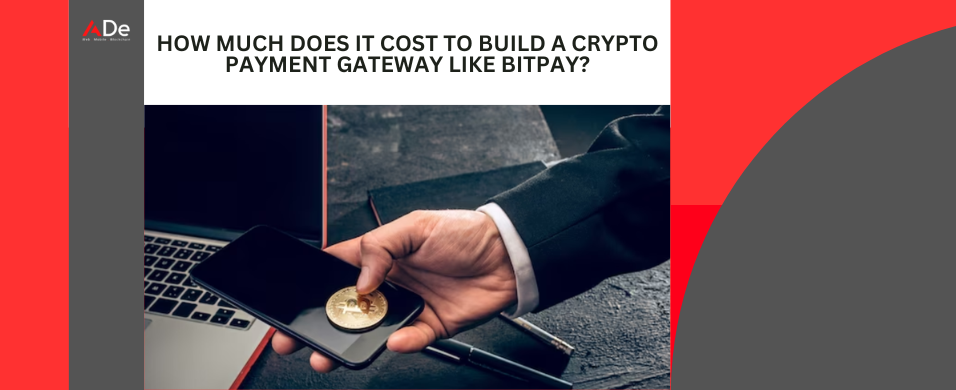As the world increasingly adopts cryptocurrencies, businesses are looking for ways to integrate crypto payments into their systems. A crypto payment gateway, like BitPay, allows merchants to accept cryptocurrencies as a form of payment, which can be converted into fiat currency. If you’re considering building a similar platform, it’s essential to understand the costs involved. This blog will break down the various factors that contribute to the overall cost of developing a crypto payment gateway.

Understanding the Core Components
Before diving into the costs, let’s understand the core components required to build a crypto payment gateway:
-
User Interface (UI) and User Experience (UX) Design: Creating an intuitive and user-friendly design for both merchants and customers.
-
Wallet Integration: Securely integrating various cryptocurrency wallets.
-
Transaction Processing: Handling the sending and receiving of cryptocurrency transactions.
-
Security Features: Implementing robust security measures to protect against fraud and hacking.
-
Regulatory Compliance: Ensuring the platform complies with relevant regulations and legal requirements.
-
Customer Support: Providing support for users facing issues or needing assistance.
-
Additional Features: Extra functionalities like invoicing, recurring payments, and multi-currency support.

Detailed Cost Breakdown
-
UI/UX Design
- Cost: $5,000 – $15,000
- Description: A well-designed UI/UX is crucial for user satisfaction. This cost covers wireframing, prototyping, and final design of the web and mobile interfaces.
-
Backend Development
- Cost: $20,000 – $50,000
- Description: The backend is the core of your payment gateway. This involves developing the server-side logic, database management, and integration with blockchain networks. High-quality backend development ensures smooth transaction processing and scalability.
-
Frontend Development
- Cost: $15,000 – $30,000
- Description: The frontend involves coding the user interface designed during the UI/UX phase. This includes web and mobile application development.
-
Blockchain Integration
- Cost: $20,000 – $40,000
- Description: Integrating blockchain technology is fundamental for a crypto payment gateway. This involves setting up nodes, smart contracts, and ensuring secure transaction processing.
-
Security Features
- Cost: $10,000 – $20,000
- Description: Security is paramount. This includes implementing encryption, two-factor authentication, anti-fraud measures, and regular security audits.
-
Regulatory Compliance
- Cost: $10,000 – $30,000
- Description: Ensuring compliance with international and local regulations is critical. This may involve legal consultations, obtaining licenses, and implementing KYC (Know Your Customer) and AML (Anti-Money Laundering) procedures.
-
Wallet Integration
- Cost: $10,000 – $20,000
- Description: Integrating various cryptocurrency wallets to enable users to store, send, and receive different types of cryptocurrencies.
-
Customer Support System
- Cost: $5,000 – $15,000
- Description: Setting up a customer support system, including live chat, email support, and a ticketing system, to assist users.
-
Testing and Quality Assurance
- Cost: $10,000 – $20,000
- Description: Thorough testing of the platform to identify and fix bugs, ensuring the system works smoothly across different devices and scenarios.
-
Maintenance and Updates
- Cost: $5,000 – $15,000 per month
- Description: Ongoing maintenance and regular updates are essential to keep the platform secure and up-to-date with the latest features and regulatory requirements.
-
Marketing and Launch
- Cost: $10,000 – $30,000
- Description: Promoting the platform to attract users and merchants. This includes digital marketing, PR campaigns, and initial launch events.
Total Estimated Cost
Adding up the above components, the total estimated cost to build a crypto payment gateway like BitPay can range from $100,000 to $300,000. However, it’s important to note that this is a rough estimate, and actual costs can vary based on several factors, such as the complexity of features, the development team’s expertise, and geographic location.
Factors Influencing the Cost
-
Development Team Location: Hiring a development team in regions with lower labor costs can reduce expenses, but it’s crucial to balance cost with quality.
-
Platform Complexity: More complex features and functionalities will increase development time and costs.
-
Third-Party Services: Using third-party services for some components, like cloud hosting or additional security features, can add to the cost.
-
Regulatory Environment: Compliance with different regulatory environments can affect the overall cost, particularly if operating in multiple countries.
-
Technology Stack: The choice of technology stack (programming languages, frameworks, etc.) can influence development costs and future scalability.
Cost-Saving Tips
-
Start with an MVP: Begin with a Minimum Viable Product (MVP) to test the market and gather feedback before investing in a full-scale platform.
-
Outsource Development: Consider outsourcing to experienced blockchain development firms that can offer competitive rates.
-
Use Open-Source Solutions: Leverage open-source libraries and frameworks to reduce development time and costs.
-
Agile Development: Adopt agile development practices to ensure efficient use of resources and timely delivery of features.
conclusion
Building a crypto payment gateway like BitPay is a significant investment, but it can be a lucrative venture given the rising popularity of cryptocurrencies. By understanding the various cost components and planning strategically, you can develop a robust and competitive platform. Always ensure to balance cost with quality and security, as these are crucial for the success of any financial service platform.


